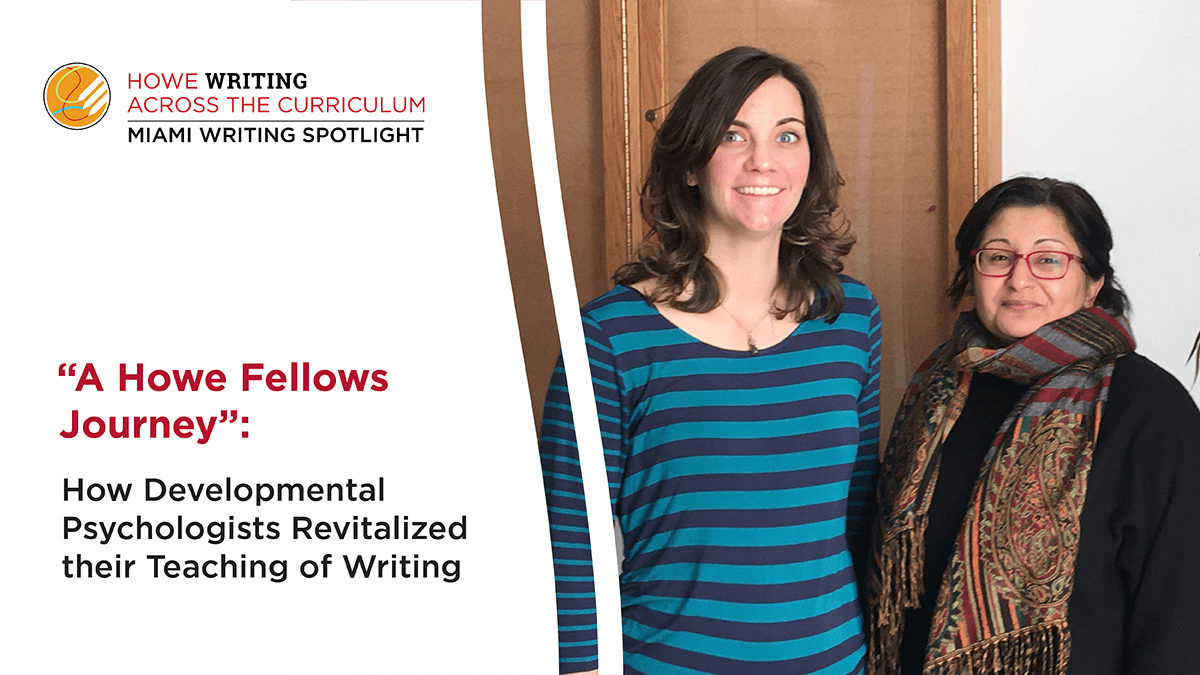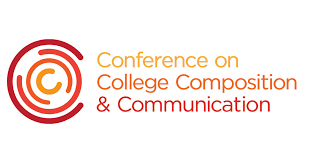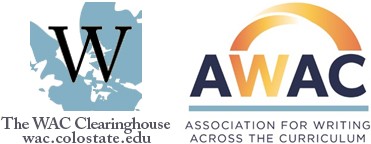"A Howe Fellows Journey": How developmental psychologists revitalized their teaching of writing
“Scavenging” for clues about writing
The fellows came away from the program ready to pursue new approaches in their teaching and new directions in their research.
Namely, for a while, the fellows had been noticing a gap in writing between majors and non-majors in their courses.
“One of the things we wanted to figure out in the Fellows program,” Spangler-Cropenbaker explains, “was how to reach both thematic sequence students as well as our majors when there are research projects and when there is a writing component in our classes.” During Fellows, they took the opportunity to go on the hunt—quite literally—to find a solution to close that gap.
Their solution? Develop a “scavenger hunt” exercise that helps students analyze conventions of writing in developmental psychology.
In the scavenger hunt, students analyze an article, asking questions like: Who is the intended audience? What’s the newest citation? What’s the oldest citation? How does the author discuss their findings?
The following are example questions included in the scavenger hunt activity that the developmental psychology faculty developed for students.
- How would you properly format the citation of this article as if it were in the reference section of a paper?
- How would you cite this as an in-text citation in your paper?
- What is the research question the author(s) are asking in their paper?
- Does this article come from the perspective that develop is lifelong?
- What developmental domains are the researchers focused on?
- What mechanisms of developmental science are the authors highlighting?
- Are the researchers examining development within an individual or group context. If group, which group are they studying?
- What theoretical support do the researchers cite to illustrate the value in this work?
- Do you recognize any of the researchers they are citing in their introduction? (it's okay if the answer is no, but tell us who you do recognize if you do!)
- Identify the outline of the paper. Does it follow a predictable structure?
These kinds of questions open up opportunities for the faculty to discuss writing conventions and values that may seem arbitrary to students who are just learning how to write like developmental psychologists.
After analyzing the article, students compete in teams to see who knows the most about writing conventions in the field.
“I actually used it in class yesterday,” says Spangler-Cropenbaker excitedly. “It was awesome!”
Kalia has also found making expectations explicit to her students a useful exercise. “As a researcher,” she says, “you're always aware that when you send material out to journals, each of them has its own idiosyncratic way of following the rules that are laid out in the rulebook. Yet when you teach, you become really emphatic about the rules. It was great to be able to sit down and say, ‘These are the rules we actually care about, let's make sure that these are figured out.’”
Both fellows hope that making writing conventions and values explicit in their classes will help students transfer their writing knowledge vertically throughout the curriculum. In fact, they hope that they can research and assess how their new teaching practices are helping students learn how to write better. Particularly, they want to know if it’s helping non-majors in their courses learn the conventions of the field.
As I talk to the two fellows, they’re just in the beginning stages of what they both think will be a fruitful research collaboration between them. “It's new and we're trying to think of what's to come,” says Spangler-Cropenbaker.
But they’re excited to see what happens in the future. “I could anticipate us tracking to see how non-major students end up doing over time,” Kalia muses.
Even so, the scavenger hunt already promises great student engagement, if nothing else.
“They were excited about it,” says Spangler-Cropenbaker. “It was pretty neat to see. They were all checking in with each other and working together. It was pretty cool.”
Lasting meaning
As the fellows reflect on their experiences, they underscore just how meaningful they found their time in the Howe Faculty Writing Fellows program.
“As an instructor,” says Spangler-Cropenbaker, “it was eye opening to think about how I can communicate to students the threshold concepts that are meaningful to us.”
“One of the things I really wanted to know,” Kalia reflects, “was how to help students transfer their writing across the curriculum. That was really important to me because I'd struggled with the same stuff for the two-hundred and three-hundred and four-hundred level.”
Back when the fellows started the program, they were frustrated, but now that they can see the big picture, they speak with some amusement about their initial skepticism.
“We are not good at being students anymore,” Kalia concludes. “We haven't been students in a while, so it's hard for us. I think that was part of it: not knowing. I definitely had those moments where I was like, ‘Just tell me! What should I know?’”
Kalia’s advice to future fellows? “Just wait,” she says. “Be patient and you'll get there. It's hard being a student because you have to let go and exercise some trust.”
“Yeah,” Spangler-Cropenbaker agrees. “It's a Howe Fellows journey.”
Howe Writing Across the Curriculum Programs
The mission of the Howe Writing Across the Curriculum Programs is to ensure that all Miami faculty and graduate teaching assistants can effectively include writing as a means to support learning in their courses and programs.


